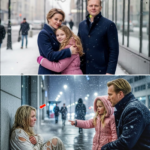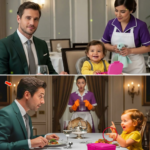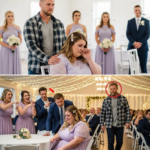It was a stormy December afternoon, the kind where the rain feels like the sky is mourning, and the streets of the capital turned to rivers. Rodrigo Mendoza, a 65-year-old real estate tycoon, sat inside his luxurious black Mercedes-Benz, adjusting his Italian silk tie as he prepared for a meeting that could secure his empire’s international expansion. He had built everything—wealth, reputation, power—but as fate would have it, he was moments away from realizing he had nothing.

As his chauffeur waited, Rodrigo stepped out of the car into the pouring rain, briefcase in hand. What happened next wasn’t in any business plan.
A boy, soaked to the bone and barely twelve, appeared from the shadows of the street. Dirty, thin, and desperate, the child looked directly into Rodrigo’s eyes and shouted words that cut deeper than the cold wind ever could:
“You are my father!”
Rodrigo froze.
The words didn’t make sense—yet something about the boy’s eyes, a familiar hue of warm brown, and the determined set of his jaw sparked a feeling he couldn’t shake. The boy repeated himself, louder this time, less afraid: “You’re Rodrigo Mendoza. My mom told me. You’re my dad.”
In that moment, Rodrigo forgot everything—the meeting, the investors, the empire. All that remained was the child before him.
The boy’s name was Diego Ramírez. His mother, Carmen, had once been Rodrigo’s secretary. They’d had a short but passionate affair 13 years earlier, a period when Rodrigo was separated from his wife. But when he decided to reconcile for the sake of his image and fortune, he cut off all contact with Carmen. He never knew she was pregnant. Never knew he had a son.
Now here Diego stood, a child raised in poverty and sorrow, telling him that Carmen had died of cancer just three months ago. Her dying wish? That Diego find his father.
Rodrigo, shaken and speechless, canceled his meeting. He brought Diego home.
At first, Diego was guarded—unsure if this rich man really wanted him or was just another adult about to turn him away. But slowly, walls began to fall. Rodrigo saw the resemblance more clearly with each passing hour: Diego’s thoughtful frown, his clever wit, his resilience. But the confirmation came when Diego named small, intimate details about Rodrigo: the scar on his right hand from a childhood accident, the nervous habit of scratching behind his left ear, the awful singing of “La Llorona” in the shower.
There was no denying it.
Diego was his son.
In a single day, Rodrigo’s life rewrote itself. He wasn’t just a billionaire anymore. He was a father.
He gave Diego a room in his mansion, had clothes tailored for him, meals prepared, tutors hired—but most importantly, he gave him his time. Rodrigo didn’t want to be just a provider. He wanted to be a parent. He called off his meetings for the week, contacted a child psychologist, and began the legal adoption process. He even altered his will.
They visited Carmen’s grave together. Rodrigo promised her he would care for Diego and make up for the lost years. For Diego, who had slept on cold streets and hid food out of fear, this wasn’t about material comfort. It was about belonging. About finally having someone who stayed.
Rodrigo had spent decades building towers of glass and concrete. But this child, he realized, was the most important thing he’d ever build—a relationship forged not by contracts, but by trust, patience, and love.
Six months later, Rodrigo sat in the bleachers at Diego’s first soccer match, shouting his name like any proud parent. They lost the game, but to Rodrigo, it felt like victory. That night, Diego asked, “Do you think Mom is proud of us?” Rodrigo answered honestly, “I know she is.”
Their home became more than a mansion—it became a place of laughter, homework, late-night talks, and music. Rodrigo began saying “I’m Diego’s dad” instead of listing his business titles. And Diego, for the first time in his life, had an answer to the question, “Where do you live?”
“A home,” he would say. “Not just a house.”
One year after that rainy encounter, Rodrigo threw Diego a birthday party. Nothing extravagant—just friends, family, and joy. As Diego blew out his candles, he turned to his father and said, “Make a wish, Dad.”
“I already did,” Rodrigo replied, “and it came true.”
That night, as stars shimmered above, Rodrigo received a message from Diego: Thanks for the best birthday ever. I love you. Rodrigo smiled through tears and typed back: Thank you for making me your dad. I love you too.
In the end, it wasn’t the towers or the titles that defined Rodrigo’s legacy. It was the love he found—late, but not too late. Because sometimes, the greatest riches aren’t made of gold or land, but of second chances, quiet forgiveness, and the courage to love when it matters most.
News
Virgínia Rompe o Silêncio Sobre Leonardo no Hospital e Revela Mágoa Que Ninguém Imaginava
A segunda-feira começou tensa para o mundo sertanejo e para milhões de seguidores atentos a cada movimento da família Costa….
Virgínia rompe o silêncio, se recusa a visitar Leonardo no hospital e expõe ferida que vinha crescendo dentro da família
A madrugada de segunda-feira começou diferente. Ainda antes do sol nascer, portais de Goiás noticiaram que Leonardo havia sido internado…
Sumiço de Neymar em Paris e Story de Biancardi Acendem Alerta: Coincidência ou Recado Silencioso?
O silêncio, às vezes, fala mais alto do que qualquer pronunciamento. E foi exatamente esse silêncio que transformou a ausência…
O silêncio de Neymar, o sumiço repentino e a indireta de Biancardi que deixou tudo ainda mais tenso
Tudo aconteceu de forma silenciosa demais para ser normal. Sem anúncio oficial, sem justificativa clara e sem aquela movimentação típica…
O pedido inesperado das Marias para o Natal deixa Virgínia sem reação e derrete a internet
O clima já era de festa, casa cheia, risadas espalhadas pelos cômodos e aquele barulho gostoso de família reunida quando…
O Pedido de Natal das Marias que Deixou Virgínia em Choque e Derreteu a Internet
O Natal ainda nem chegou, mas um momento simples dentro de casa foi suficiente para emocionar, arrancar risadas e surpreender…
End of content
No more pages to load









